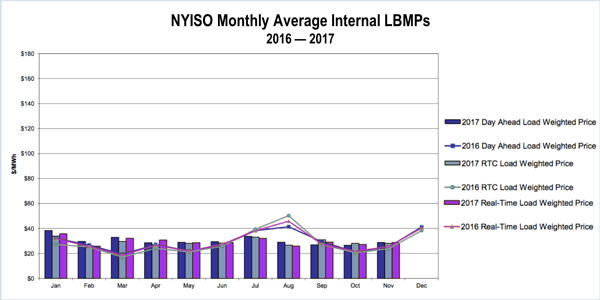RENSSELAER, N.Y. — NYISO year-to-date monthly energy prices averaged $34.72/MWh in November, a 5% increase from a year earlier, Senior Vice President for Market Structures Rana Mukerji told the ISO’s Business Issues Committee (BIC) on Wednesday.
Locational-based marginal prices (LBMPs) averaged $30.60/MWh for the month, up 8% from October and up 16% from November 2016. The ISO’s average daily sendout was 403 GWh/d, compared with 398 in October and a year earlier.
New York natural gas prices gained nearly 19% in November, averaging $2.92/MMBtu at the Transco Z6 hub. Prices were up 33.5% from a year ago.
Distillate prices gained 31% year on year, with Jet Kerosene Gulf Coast averaging $13.04/MMBtu, up from $12.30 in October. Ultra Low Sulfur No. 2 Diesel NY Harbor averaged $13.70/MMBtu, compared with $12.86 in October.
The ISO’s local reliability share was 20 cents/MWh, up 6 cents/MWh from the previous month, while the statewide share dropped 10 cents/MWh from the previous month to -50 cents/MWh. Total uplift costs were lower than in October.
RTC and RTD Efficiency
In reviewing NYISO’s Broader Regional Markets report, Mukerji highlighted the ISO’s effort to increase the consistency between real-time commitment (RTC) and real-time dispatch (RTD) modeling and identify improvements to look-ahead evaluations in order to improve scheduling and price convergence. The Market Issues Working Group reviewed staff analysis of the issue Dec. 5, and the ISO expects by the end of the year to release a whitepaper identifying efforts to further explore RTC-RTD convergence in 2018.
Mukerji also noted that PJM has asked NYISO to review the former’s proposed pro forma pseudo-tie agreement that would apply to New York Control Area generators that sell all or a portion of their capacity to the RTO. PJM would provide commitment and dispatch instructions to pseudo-tied generators, which would be committed and dispatched to meet the RTO’s — rather than NYISO’s — needs.
NYISO has expressed concerns about using PJM’s proposed pseudo-tie agreement but said it’s prepared to work with the RTO to evaluate potential alternate solutions acceptable to both grid operators. FERC last month issued an order (ER17-1138) accepting many of PJM’s proposed pseudo-tie rules. Rehearing requests on the order are due Dec. 15, and NYISO said it was still evaluating its options.
Mukerji said NYISO is also modifying the rules for documenting capacity imports across PJM AC ties. The ISO’s proposal would require load-serving entities to submit evidence that an external resource with a capacity award has firm transmission service across the ties on the same day installed capacity (ICAP) results are posted. The Installed Capacity Working Group last month reviewed sample document types that would satisfy the requirement, which is slated to become effective May 1, 2018.
NYISO is additionally negotiating with PJM on cost sharing for the Ramapo 3500 phase angle regulator that was replaced by Consolidated Edison in September and plans to hold a joint NYISO/PJM stakeholder meeting on the issue in early 2018, Mukerji said.
On/Off Ramp Rule Changes
The committee also reviewed a complete market design proposal for “on/off ramp” rules the ISO uses to decide whether to eliminate or create localities within its market. Randy Wyatt, senior market design specialist for the ISO, told the committee that the proposed methodology is based on reliability planning principles.
Wyatt said the project is designed to ensure that locality price signals allow developers to make informed and efficient investments that enhance grid reliability. The committee will take up the subject again in the first quarter of 2018.
Charter Update for Integrating Public Policy Task Force
NYISO Executive Vice President Rich Dewey presented a revised charter for the Integrating Public Policy Task Force (IPPTF), which he said incorporated “some, but not all” stakeholder comments received so far.
The charter states that the BIC will receive monthly progress reports from the task force and that “any potential changes to NYISO tariffs, agreements, manuals or any other guiding documents” will be subjected to the ISO’s governance process.
NYISO and the New York Public Service Commission jointly formed the task force in October to create a forum for stakeholders to discuss pricing carbon into the wholesale electricity market. The task force held its first technical conference on Monday. (See New York Hashes out Details of Carbon Policy.)
Dewey acknowledged that there had been some confusion about why a new group was needed and explained that planners realized that integrating the state’s policy on carbon into the power markets would require a high degree of coordination between the ISO and state agencies.
The IPPTF’s next public hearing is scheduled for Jan. 8 in Albany.
— Michael Kuser





